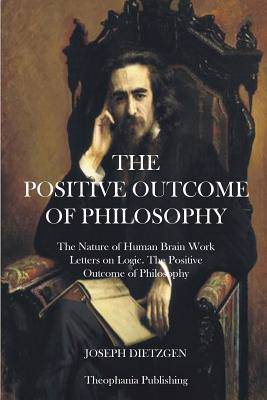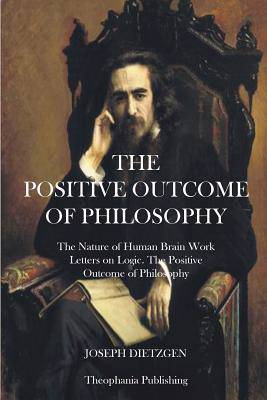
- Afhalen na 1 uur in een winkel met voorraad
- Gratis thuislevering in België vanaf € 30
- Ruim aanbod met 7 miljoen producten
- Afhalen na 1 uur in een winkel met voorraad
- Gratis thuislevering in België vanaf € 30
- Ruim aanbod met 7 miljoen producten
Zoeken
The Positive Outcome of Philosophy
The Nature of Human Brain Work Letters on Logic
Joseph Dietzgen
Paperback | Engels
€ 43,95
+ 87 punten
Uitvoering
Omschrijving
Thank you for checking out this book by Theophania Publishing. We appreciate your business and look forward to serving you soon. We have thousands of titles available, and we invite you to search for us by name, contact us via our website, or download our most recent catalogues. In the history of philosophy we see before us the consecutive forms of the thoughts of the ruling classes of society on life and on the world at large. This class thought appears after the primitive communism has given way to a society with class antagonisms, at a stage when the wealth of the members of the ruling class gave them leisure time and thus stimulated them to turn their attention to the productions of the mind. The beginning of this thought is found in classic Greece. But it assumed its clearest and best developed form when the modern bourgeoisie had become the ruling class in capitalistic Europe and the thinkers gave expression to the ideas of this class. The characteristic mark of these ideas is dualism, that is to say the misunderstood contrast between thinking and being, between nature and spirit, the result of the mental unclearness of this class and of its incapacity to see the things of the world in their true interconnection. This mental state is but the expression of the division of mankind into classes and of the uncomprehended nature of social production ever since it became a production of goods for exchange.
Specificaties
Betrokkenen
- Auteur(s):
- Uitgeverij:
Inhoud
- Aantal bladzijden:
- 444
- Taal:
- Engels
Eigenschappen
- Productcode (EAN):
- 9781484918654
- Verschijningsdatum:
- 8/05/2013
- Uitvoering:
- Paperback
- Formaat:
- Trade paperback (VS)
- Afmetingen:
- 152 mm x 229 mm
- Gewicht:
- 589 g

Alleen bij Standaard Boekhandel
+ 87 punten op je klantenkaart van Standaard Boekhandel
Beoordelingen
We publiceren alleen reviews die voldoen aan de voorwaarden voor reviews. Bekijk onze voorwaarden voor reviews.











